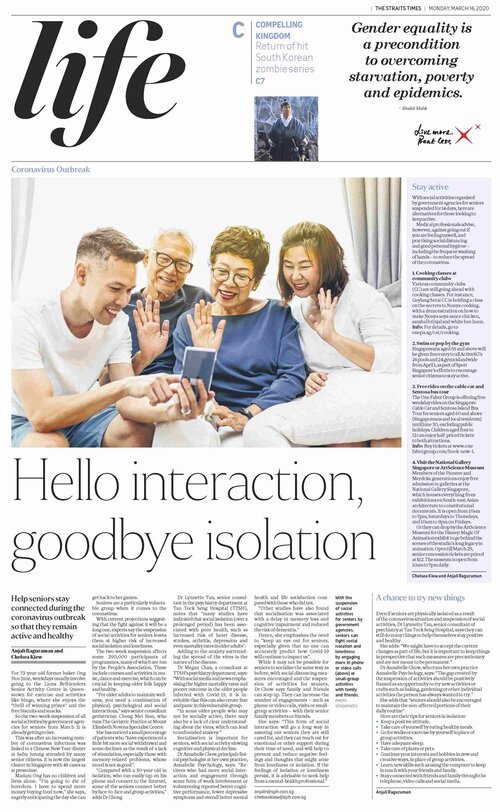COVID-19 RESOURCES
Pandemic Fatigue
What is Pandemic Fatigue? What are some signs of it?
“Pandemic Fatigue” refers to a mental state where a prolonged, heightened state of fear & caution leads to a form of burnout.
Pandemic Fatigue presents itself differently in different people. Here are some ways that it might manifest:
Ψ Feeling physically numb and socially withdrawn
Ψ Becoming irritable, sensitive, or impatient
Ψ Becoming less diligent about COVID-19 prevention measures such as handwashing, wearing a mask, or observing social distancing norms.
Ψ Reduced enjoyment from activities you used to like
Ψ Consumption more “comfort food” or alcohol
Ψ Constantly feeling tired and yet experiencing difficulties getting a good night’s sleep.
Why do we feel this way?
Different people are likely to experience pandemic fatigue at different periods of time. People who were affected by the pandemic or who entered into the heightened state of caution at an early stage are likely to experience an earlier onset of pandemic fatigue. Persons who did not witness first-hand the effects of the pandemic, or who were compulsorily subjected to precautionary or prevention measures without understanding the need for such measures, might also experience pandemic fatigue earlier.
Feelings of complacency might also begin to emerge due to desensitisation through extended media exposure to COVID-19. Much like the principles behind exposure therapy, repeated exposure to pandemic-related news will eventually diminish the initial feelings of anxiety and caution. Consequently, we may begin to engage in behaviours that were initially inhibited by the anxiety responses such as not adhering to safe distancing rules or washing our hands as regularly as we did before.
A toll on our emotions and mental health
Pandemic prevention measures such as social avoidance and distancing can make people feel isolated, lonely, and increase stress and anxiety. Long term worries about a pandemic takes a toll on your mental and emotional health and might result in the worsening of mental health conditions and chronic health problems. Changes in mood, tastes and preferences, sleeping patterns, increased use and reliance on substances such as alcohol and tobacco are typical effects.
A prolonged stress response is also detrimental to the body as it disrupts the body’s natural functions. While natural stress hormones such as cortisol and adrenaline are useful body functions that brings about short term benefits (e.g., enhanced brain function, increased energy for immediate muscle action), long term stress might result in headaches, an inability to focus, digestive issues, insomnia, and a weakened immune system. This ultimately affects our overall daily functioning.
I’m struggling with this “new normal”. How can I better adapt to this situation?
One suggestion is to adopt a “journey mindset”! Trying to predict when COVID-19 will end can be frustrating as it is surrounded by so much uncertainty; we should focus instead on the quality of the touchpoints in our daily lives. Try and make small improvements to each of these touchpoints, regardless of whether it is directly related to the pandemic (e.g. making an effort to pay more attention to social distancing in public places, not touching your face while in public) or to your own personal growth (e.g. mindful interactions with your interpersonal relationships, picking up a new skill or hobby). It is also helpful to lean on our social circles for mutual support through this difficult time.
Some other suggestions include:
Ψ Establishing fixed points in your daily routine (e.g. work, meals, family obligations), & fill up the other times with solo or group activities that you enjoy.
Ψ If permissible, step outside of your house for occasional sunlight and fresh air, even if it is for a short while.
Ψ Limiting over-exposure to COVID-19 related news, especially when it feels too overwhelming.
Ψ Managing your expectations of yourself and others. Recognise that the pandemic affects everyone in different ways.
Don’t forget to create little pockets of fun and joy in your routine by doing things you enjoy such as a baking day once a week, or a self-care hour alternate day, or perhaps a virtual meeting with your friends every Sunday evening over drinks.
How do I overcome feelings of isolation and loneliness?
In general, feelings of loneliness can be caused by the loss of one’s sense of purpose. This usually happens when boredom is coupled with feelings of a lost sense of self.
Here are some suggestions that you may find helpful in overcoming such feelings:
Ψ Reintroduce meaning and importance into your days by signing up for an online webinar or course to learn a new skill or upgrade yourself.
Ψ Check in with your loved ones frequently.
Ψ Do not be ashamed to ask for help if needed. If opportunities for real-life interactions are limited, connect with others on virtual support groups, communities, and even telehealth platforms.
Ψ Offering a helping hand to others can help us feel connected to others.
Ψ During this time, there are also others that would benefit from your acts of kindness. Even if you do not feel “100%” or feel that you are unable to offer any real support, the mere act of showing concern and spending a few minutes each day with your loved ones will be deeply appreciated.
Ψ Keep your mind stimulated with “active” hobbies such as playing an instrument, painting, or cooking, as opposed to more passive activities such as binge watching a Netflix show.
Ψ Turn more passive activities (e.g. reading) into something more engaging by creating or joining a virtual book club with your friends or an online community.




